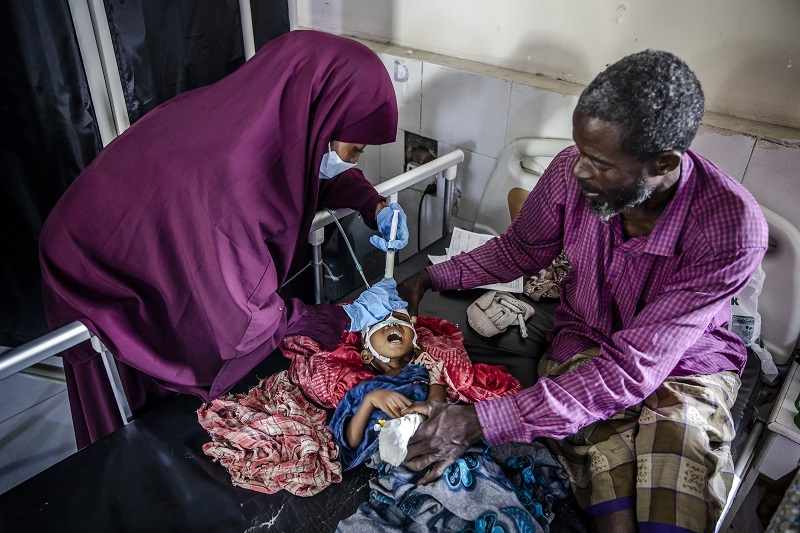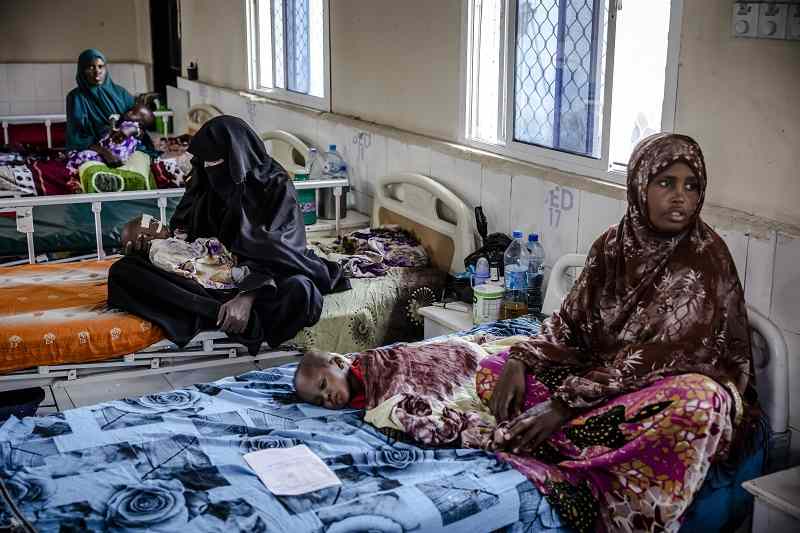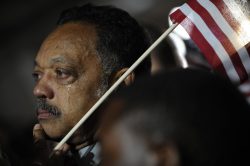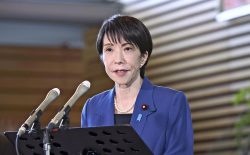
A nurse feeds 2-year-old Suldano Idow, who is severely malnourished, with the help of his father, Idow Abdirahman, in the pediatric stabilization center at Banadir Hospital in Mogadishu on June 13.
15:51 JST, July 7, 2022
MOGADISHU — Inside Banadir Hospital, Boshey Maalim cradled her 3-year-old girl, Iqra. Her ribs protruded and she sucked in air through an oxygen tube taped to her gaunt face. She was 14 pounds, less than half of what she should weigh.
There were children like Iqra in every bed in the severe malnutrition ward, sickly and skeletal. Doctors and nurses struggled to help them.
For me, it was a heartbreakingly familiar scene.
I had covered hunger in Somalia before, most recently during the 2011 famine, when some 250,000 people died, half of them under 5 years old. Only this time, I saw the catastrophe through a different prism.
Three weeks earlier, I had been reporting on the war in Ukraine, and I was stuck by the contrast in how the world has reacted to these two immense tragedies. The international community has funded only 18% of the United Nations’ $1.5 billion appeal to help Somalia and its neighbors in East Africa. By comparison, the U.S. Congress approved $7.5 billion in economic aid for Ukraine last month.
Ukrainians fleeing war have been welcomed in many European nations, as well as in the United States. Displaced Somalis have languished for years in decrepit camps, and hundreds more families are joining them each day, fleeing starvation and burying their children along the way.
As I looked around the malnutrition ward, I felt little hope for the babies wasting away from hunger. Some were crying feebly, a chorus of pain floating from bed to bed. The cries of 3-year-old Salim rose above the rest; his legs were thin as sticks, his skin was peeling. His mother solemnly poured water on a cloth, then gently caressed his small head.

Women care for their severely malnourished children at Banadir Hospital.
On my last visit to Somalia a decade ago, I flew in on an aging plane with torn, rickety seats that swung past the coast of the Indian Ocean and swooped down for a swift landing. This was partly to avoid being targeted by al-Shabab, the Islamic militant group that was seeking to overthrow the fragile government.
This time, I flew in on a comfortable Turkish Airlines flight that swerved quickly up as it was about to land, then circled again around the desolate terrain before aligning itself with the coast and descending. I was told that this was a training exercise in the event al-Shabab attacked the airport.
The militants are still powerful. The government is still weak. But the landscape has changed dramatically.
There were only a few buildings around the airport last time, most notably a pink single-story compound that housed the CIA. There were no Western embassies, no U.N. offices. The militants controlled large parts of Mogadishu, including Bakara market where 19 American troops were killed in 1993 during a failed peacekeeping mission depicted in the book and movie “Black Hawk Down.”
A pickup truck filled with armed men waited to take me into the city, where I would spend my nights sleeping on the floor of an office inside the nation’s Information Ministry, among the most heavily guarded places at the time. The militia members were from the same clan, procured by a trusted friend. They cost $1,000 a day.
I had four days to work. By the last day, I was told, al-Shabab spies inside the capital would know that a Western journalist was there — and I would become a target.
Today the airport is part of a sprawling, highly secured enclave that is walled off from the rest of Mogadishu. Locals call it the Green Zone — after the U.S. compound in Baghdad — and it is where the United States and other Western nations house their embassies, where U.N. agencies and aid groups are based, where most visitors stay in expensive hotels and camps run by private security companies.
Al-Shabab has been driven out of Mogadishu, but its operatives still lurk here. There have been assassinations and bombings.
Getting to Banadir Hospital, outside the Green Zone, still required a militia. Only now, there were so many security companies that the price had been slashed to $230 a day. And the men with guns go by a more polite name now — “armed security escorts.”
Maalim and Iqra fled an area controlled by al-Shabab because there was no food, aid agencies or medical clinics.
The militants, who typically tax farmers, didn’t demand a portion of their harvest because of the failed rains. But they still took some livestock, said Maalim, depriving them of income to buy food.
Two of her children, ages 1 and 2, died of hunger before she fled her village in April. Last month, three more children died in an overcrowded displacement camp near Mogadishu after they caught measles and lost their appetite. When Iqra, her last child, started to deteriorate, she rushed her to the hospital, having to beg relatives for the taxi fare.
“I didn’t want her to suffer the same fates as the others,” said Maalim, 29, staring at her daughter, who cried softly.
In other beds, other children teetered between life and death. The hospital is running short of therapeutic food and milk and some medicines are out of stock, Amaan Aden, the physician who heads the malnutrition unit, told me.
Aside from the shortfalls in international assistance, global food prices are skyrocketing, fueled by the war in Ukraine. Russia and Ukraine are among the world’s largest exporters of grains, cooking oil and fertilizers, and they provided nearly all of Somalia’s wheat before the conflict began in February.
Children are increasingly arriving with symptoms of cholera, triggered by malnutrition, said Layla Mire Mohamed, the head nurse in the hospital’s treatment center. “The camps are overcrowded and there’s no running water there,” she said. “The cases are growing day by day.”
I asked Somalia’s special presidential envoy for drought response why the world was looking the other way. One reason, he said, was donor fatigue – the suffering of people in a nation long perceived as a failed state was almost taken for granted. Even in the best of times, Somalia needs assistance. And then there is Ukraine, he added, which is taking so much of the attention and resources of the international community.
“We are urging the United States to increase its humanitarian assistance,” said Abdirahman Abdishakur Warsame, the envoy. “But the rest of the world and the European Union, they are focused on Ukraine.”
Inside the ward, Maalim had no idea about the war in Ukraine or its long reach. She doesn’t know that if the conflict continues, if food prices keep rising, if aid pledges aren’t met, the hospital could face even more dramatic shortages of food and medicines.
All she can think about is Iqra.
“I don’t want to be without children,” said Maalim, bringing her child closer. “But only God knows if she will survive.”
Top Articles in News Services
-

Prudential Life Expected to Face Inspection over Fraud
-

Hong Kong Ex-Publisher Jimmy Lai’s Sentence Raises International Outcry as China Defends It
-

Survey Shows False Election Info Perceived as True
-

Japan’s Nikkei Stock Average Touches 58,000 as Yen, Jgbs Rally on Election Fallout (UPDATE 1)
-

Trump Names Former Federal Reserve Governor Warsh as the Next Fed Chair, Replacing Powell
JN ACCESS RANKING
-

Japan PM Takaichi’s Cabinet Resigns en Masse
-

Japan Institute to Use Domestic Commercial Optical Lattice Clock to Set Japan Standard Time
-

Israeli Ambassador to Japan Speaks about Japan’s Role in the Reconstruction of Gaza
-

Man Infected with Measles May Have Come in Contact with Many People in Tokyo, Went to Store, Restaurant Around When Symptoms Emerged
-

Prudential Life Insurance Plans to Fully Compensate for Damages Caused by Fraudulent Actions Without Waiting for Third-Party Committee Review




















